Last year, the government has released draft guidelines to prevent carpooling from turning into a commercial activity
The Motor Vehicles Act clearly mandates that private cars can not be allowed to run as app-based taxis
BlaBlaCar had wrapped up active operations in India at the beginning of 2017 as they could not sustain carpool business in India
Inc42 Daily Brief
Stay Ahead With Daily News & Analysis on India’s Tech & Startup Economy
In a bid to reduce congestion on roads, the transport ministry has reportedly planned to issue guidelines on shared mobility in December, focusing on pooling services by private car owners.
The government has been supporting shared mobility to tackle pollution and reduce congestion on the roads. One of the agenda items for the National Mission for Transformative Mobility is vehicle pooling and the guidelines are said to be largely the same.
In 2019, the transport ministry had suggested the following guidelines to prevent carpooling from turning into a commercial activity:
- Individuals opting to earn from carpooling will have to work on a no-profit, no-loss model.
- Operators will have to split the cost, rather than turning carpooling into a commercial activity.
- Restrictions on carpooling by private vehicles through any other platform, except mobile apps.
- These mobile apps will have to roll out a KYC enabled system to verify the vehicle owner and the rider.
- A vehicle owner will have to declare the trip details before starting the trips.
- Limit on the maximum number of rides taken per day to four.
- The government also planned to generate revenue out of carpooling by recommending carpooling aggregators to start pursuing a model where state governments also get some revenue.
However, the Motor Vehicles Act clearly mandates that private cars can not be allowed to run as app-based taxis. It also states that car-pooling, ride-sharing operations are only to be allowed for commercial vehicles.
The entry of private vehicles for carpooling is also antithetical to the intestrets of existing cab owners who pay higher duties, toll taxes, insurance premiums, and other permit charges.
“The norms for ridesharing through non-transport private vehicles will be released in a month. The idea is to encourage adoption of shared mobility, via cars or bikes. After this, states will have to implement it at their own discretion,” a senior government official told Mint.
Carpooling Not Successful In India
While people are resistant to carpooling, human safety is altogether different and massive consideration, which might force a behavioural change in consumers permanently. It should have features like customer identification, GPS tracking technology, number masking, SOS button etc. to ensure the safety of the travellers.
Cab aggregator Uber’s car-pooling service “Uber Commute” has run into controversy again after its relaunch in August saw protests from two associations which claimed that the service was “illegal” and violated Motor Vehicles Act, 2019.
Shaik Salauddin, national general secretary of IFAT had said, ”Uber is promoting the unregulated use of private vehicles to ferry passengers for prescribed fares which would in turn compete with city cabs. The Motor Vehicles Act mandates cabs to pay annual taxes and permit charges to ferry passengers. Private car owners pay a one-time tax for life when the car is bought. This will also hurt the state revenue that is to be collected from commercial vehicles engaged in ride-hailing and sharing services.”
France-based global carpool major BlaBlaCar had wrapped up active operations in India at the beginning of 2017 as they could not sustain carpool business in India.
Shared Mobility Hits Covid Speedbreaker
A report by Research and Markets released in April 2020, revealed that the global shared mobility market is set to experience a slowdown due to the pandemic. The gross merchandise value (GMV) for the global market also took a hit and is estimated to grow by a mere 1.1% between 2019 and 2020.
However, with maturity in the market, there is bound to be a shift in consumer expectations around mobility too, and consequently the operating models. While mobility startups such as Rapido, Yulu, Bounce, Vogo, and others are back on the road, a lot has changed in two months of the lockdown. While earlier people were resistant to subscribing to bikes for a long period, human safety is an altogether different and massive consideration, which might force a behavioural change in consumers permanently. And that’s what many bike-sharing and two-wheeler startups are banking on to make the most of a tough situation.
{{#name}}{{name}}{{/name}}{{^name}}-{{/name}}
{{#description}}{{description}}...{{/description}}{{^description}}-{{/description}}
Note: We at Inc42 take our ethics very seriously. More information about it can be found here.


